jobs
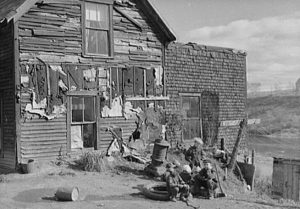 When the Great Depression hit, people in the upper-middle class, like doctors, lawyers, and other professionals, saw their incomes drop by 40%, but the middle class and low income Americans found themselves with nothing. They had no jobs and no money, and even if they did have those things, they couldn’t afford the things they needed. The prices for everything from food to clothing were much more than their meager income could buy much of. People began to move from place to place looking for a job…any job. The problem was that there were very few jobs, and lot of people standing in line to get them. The average American lived by the Depression-era motto: Use it up, wear it out, make do, or do without. People had to learn to be frugal. Clothes were patched when the started to wear out. People planted gardens and even kept little gardens in their kitchen. They stayed home, instead of evenings out. They were always in a private struggle to keep their cars or homes.
When the Great Depression hit, people in the upper-middle class, like doctors, lawyers, and other professionals, saw their incomes drop by 40%, but the middle class and low income Americans found themselves with nothing. They had no jobs and no money, and even if they did have those things, they couldn’t afford the things they needed. The prices for everything from food to clothing were much more than their meager income could buy much of. People began to move from place to place looking for a job…any job. The problem was that there were very few jobs, and lot of people standing in line to get them. The average American lived by the Depression-era motto: Use it up, wear it out, make do, or do without. People had to learn to be frugal. Clothes were patched when the started to wear out. People planted gardens and even kept little gardens in their kitchen. They stayed home, instead of evenings out. They were always in a private struggle to keep their cars or homes.
Paint was too expensive, so home fell into disrepair. As things got worse, things began to wear out, and people didn’t get rid of the junk. They simply put it out in the yard. I’m sure that they realized that every piece of junk had parts in it that could be used for repairs to something else. Everything could be reworked. They used the 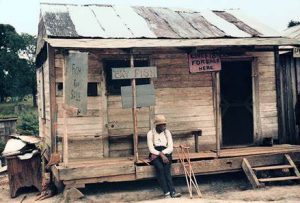 backs of worn-out overall legs to make pants for little boys and overalls for babies. They didn’t have disposable diapers back then. They made diapers and underwear out of flour and sugar sacks. When the older kids outgrew their clothes, but they were too big for the younger kids, they made smaller clothes out of bigger hand-me-downs. If their shoes wore out before a year, the children went barefooted. Many people resorted to bartering…not only goods for goods, but work for work. They tried to make their homes and their lives pretty, even in depressing times. They used patterned chicken feed sacks to make curtains, aprons, and little girl’s dresses. Worn out socks were kept, so that they could patch another sock. Nothing was thrown away. They saved string that came loose from clothing and added it to a string ball for mending and sewing. Toilet paper was a luxury that many people couldn’t afford, so they used newspaper instead. They saved every scrap of material for making quilts. People learned not to waste anything.
backs of worn-out overall legs to make pants for little boys and overalls for babies. They didn’t have disposable diapers back then. They made diapers and underwear out of flour and sugar sacks. When the older kids outgrew their clothes, but they were too big for the younger kids, they made smaller clothes out of bigger hand-me-downs. If their shoes wore out before a year, the children went barefooted. Many people resorted to bartering…not only goods for goods, but work for work. They tried to make their homes and their lives pretty, even in depressing times. They used patterned chicken feed sacks to make curtains, aprons, and little girl’s dresses. Worn out socks were kept, so that they could patch another sock. Nothing was thrown away. They saved string that came loose from clothing and added it to a string ball for mending and sewing. Toilet paper was a luxury that many people couldn’t afford, so they used newspaper instead. They saved every scrap of material for making quilts. People learned not to waste anything.
Every part of the food was used. Potato peels were food, not waste. They made soup out of a few vegetables and a scrap of meat…for flavor only. They hunted for rabbits and fished to put what protein they could on the table. When there was nothing more to eat, they had lard sandwiches. I seriously doubt if many people went to 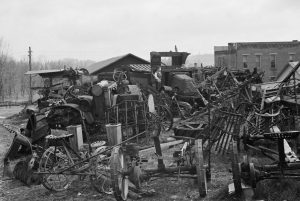 bed with a full stomach, but that didn’t mean that you turned away a stranger who was hungry. These people knew hw bad things were for them, and so they helped their neighbors. Nevertheless, during the Great Depression, suicide rates in the United States reached an all-time high, topping 22 suicides per 100,000 people. The living conditions were deplorable, and many people couldn’t take it. They felt that somehow they were at fault. still, for the majority of Americans, that didn’t mean that they gave up. Neighbor looked out for neighbor, and families came together to support each other, and while the effects of the Great Depression lasted for 12 years, this too passed, and the nation healed again.
bed with a full stomach, but that didn’t mean that you turned away a stranger who was hungry. These people knew hw bad things were for them, and so they helped their neighbors. Nevertheless, during the Great Depression, suicide rates in the United States reached an all-time high, topping 22 suicides per 100,000 people. The living conditions were deplorable, and many people couldn’t take it. They felt that somehow they were at fault. still, for the majority of Americans, that didn’t mean that they gave up. Neighbor looked out for neighbor, and families came together to support each other, and while the effects of the Great Depression lasted for 12 years, this too passed, and the nation healed again.
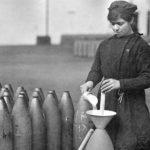 During World War I, Britain, like the United States would have to do in World War II, had to employ large numbers of women into jobs vacated by men who had gone to fight in the war. They also had to create new jobs as part of the war effort. As an example, women were hired in munitions factories. The high demand for weapons resulted in the munitions factories becoming the largest single employer of women during 1918. It was a job that many people resisted, mainly because it was seen as “men’s work.” When I think about the work these women were doing, I find myself much more concerned with the toxicity and danger of the materials they were working with, than whether or not the job should be done by a man. Of course, the materials would present the same danger to the men, but the men had always felt like the dangerous work should fall to them.
During World War I, Britain, like the United States would have to do in World War II, had to employ large numbers of women into jobs vacated by men who had gone to fight in the war. They also had to create new jobs as part of the war effort. As an example, women were hired in munitions factories. The high demand for weapons resulted in the munitions factories becoming the largest single employer of women during 1918. It was a job that many people resisted, mainly because it was seen as “men’s work.” When I think about the work these women were doing, I find myself much more concerned with the toxicity and danger of the materials they were working with, than whether or not the job should be done by a man. Of course, the materials would present the same danger to the men, but the men had always felt like the dangerous work should fall to them.
Nevertheless, with the introduction of conscription in 1916 everything changed. Conscription refers to the process of automatically calling up men and women for military service. During the First World War men (it only applied to men at this time) who were conscripted into the armed forces had no choice but to go and fight, even if they did not want to. Around 1916, with the need becoming serious, the government began 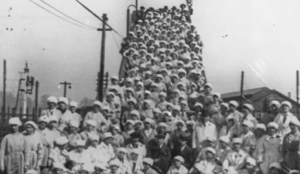 coordinating the employment of women through campaigns and recruitment drives. This led to women working in areas of work that were formerly reserved for men. Jobs such as, for example railway guards, ticket collectors, buses, tram conductors, postal workers, police, firefighters, as well as bank tellers and clerks. Some women also worked heavy or precision machinery in engineering, led cart horses on farms, and worked in the civil service and factories.
coordinating the employment of women through campaigns and recruitment drives. This led to women working in areas of work that were formerly reserved for men. Jobs such as, for example railway guards, ticket collectors, buses, tram conductors, postal workers, police, firefighters, as well as bank tellers and clerks. Some women also worked heavy or precision machinery in engineering, led cart horses on farms, and worked in the civil service and factories.
By 1917 the British munitions factories, which by this time, primarily employed women workers, produced 80% of the weapons and shells used by the British Army. The women working there soon became known as “canaries” because they had to handle TNT (the chemical compound trinitrotoluene that is used as an explosive agent in munitions) which caused their skin to turn yellow. The nickname might have been a cute joke, but the job the women did was far from funny. These women risked their lives working with poisonous substances without adequate protective clothing or the required safety measures, that we know are needed now. During the years of World War I, around 400 women died from overexposure to TNT. I wonder too, how many died in 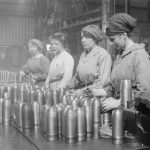 the years that followed the war, from exposure to the same chemicals that had killed the original 400 women.
the years that followed the war, from exposure to the same chemicals that had killed the original 400 women.
As if the dangerous working conditions weren’t enough, women were also paid significantly less than men in comparable positions. In 1918, women workers on London’s buses, trams, and subways organized a strike and managed to win equal pay for equal work. When the war ended, many women were fired to free up jobs for returning veterans. Some thanks that was. I’m sure many of the women were glad to go back to their prior jobs, or go home to take care of their families, but to be fired” was just wrong in every way. Nevertheless, in return for their hard work, these women were fired so that the returning men could have a job again.
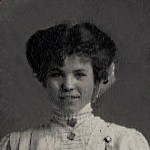 My great aunt, Mina Schumacher Spare really was a remarkable person. I wish I could say that I knew that first hand, but while she was still alive when I was born, I don’t recall if I ever met her. Nevertheless, from her sister, Bertha’s writings, I feel as though I knew her well. Mina was a woman who could see that the world was changing. She knew that women would soon have more of an active role in business, and so she decided that her training should be more that just a teaching certificate, and she encouraged her two younger sisters, Bertha and Elsa to get the same education, which they did. Her wisdom in the choice of training she should have, was what landed her jobs that men had usually held, and she was better at it than they were. Of course, Mina was a smart girl, and that was a rarity at that time. Or perhaps there were other smart girls, but they didn’t let anyone know about it. In many ways, I find that sad. I am not a feminist, and I don’t agree with most of what they do, but I’d think a woman who is smart should be allowed to use her abilities in whatever way she chooses.
My great aunt, Mina Schumacher Spare really was a remarkable person. I wish I could say that I knew that first hand, but while she was still alive when I was born, I don’t recall if I ever met her. Nevertheless, from her sister, Bertha’s writings, I feel as though I knew her well. Mina was a woman who could see that the world was changing. She knew that women would soon have more of an active role in business, and so she decided that her training should be more that just a teaching certificate, and she encouraged her two younger sisters, Bertha and Elsa to get the same education, which they did. Her wisdom in the choice of training she should have, was what landed her jobs that men had usually held, and she was better at it than they were. Of course, Mina was a smart girl, and that was a rarity at that time. Or perhaps there were other smart girls, but they didn’t let anyone know about it. In many ways, I find that sad. I am not a feminist, and I don’t agree with most of what they do, but I’d think a woman who is smart should be allowed to use her abilities in whatever way she chooses.
Mina’s first position was as a Steno-bookkeeper, and she worked office jobs from that time until her retirement with the possible exception of the years when her little daughter, Pauline was born, and then until she went to school. Mina finally retired in 1956, at her husband, John’s insistence. She fought him on the idea of retirement, but once she actually retired, she thoroughly enjoyed herself. Her husband, John joined her in retirement in 1963, and they moved to Boulder, Colorado to be closer to their daughter, Pauline (Paula) and her family. Their retired freedom was now ahead of them, but in reality, the time for blissful freedom would be short. Like her mother, Mina had Rheumatoid Arthritis. Mina passed away September 30, 1970, just seven short years after John retired.
After Mina’s passing, Bertha and Elsa had also moved to Boulder, and actually lived right next door to John, but years later, when John spoke of the anguish he felt after Mina’s passing, they were shocked. These were things John had kept to himself all that time. When he finally spoke of it, John said, “I would never have amounted to 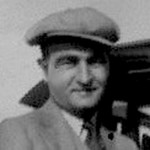 a ‘darn’ if it hadn’t been for Min.” And years later, in 1981, he said, “For the first four years after she was gone, I thought sometimes I couldn’t stand it. I would stay down stairs, where there were no memories. Upstairs I would see her everywhere.” You see, Mina was unable to navigate the stairs the last two years of her life. All her things were upstairs in the end. John’s heart was so in tuned to Mina’s, that he felt like he was left just half a man without her presence. I know many people feel like they almost can’t take it when their spouse passes away, but somehow, for John, it seemed more truth that just a feeling. Nevertheless, John knew that Mina wouldn’t have wanted him to just lay down and die, so he went on to live a full life. He passed away in 1986, and went to join his beloved Min. On their grave are these fitting words, Together Forever.
a ‘darn’ if it hadn’t been for Min.” And years later, in 1981, he said, “For the first four years after she was gone, I thought sometimes I couldn’t stand it. I would stay down stairs, where there were no memories. Upstairs I would see her everywhere.” You see, Mina was unable to navigate the stairs the last two years of her life. All her things were upstairs in the end. John’s heart was so in tuned to Mina’s, that he felt like he was left just half a man without her presence. I know many people feel like they almost can’t take it when their spouse passes away, but somehow, for John, it seemed more truth that just a feeling. Nevertheless, John knew that Mina wouldn’t have wanted him to just lay down and die, so he went on to live a full life. He passed away in 1986, and went to join his beloved Min. On their grave are these fitting words, Together Forever.
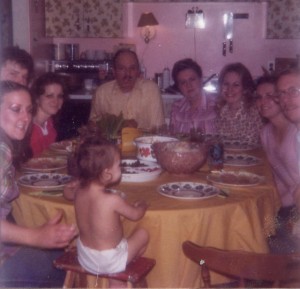 Today, I give thanks to God for all of the wonderful family and friends he has blessed me with. What would life be without all of the wonderful people in my life. This day is not about the turkey and stuffing, or the days off from work, but about all the ways God has blessed and enriched my life. The blessings He has bestowed on me are too numerous to list here, but be assured that they are to the level of overflowing. My extended family has grown exponentially this year, and that has been a blessing beyond words. To all my cousins, the new ones we have found, and those who we have known all along…you are a greater blessing than you will ever know…I love you all.
Today, I give thanks to God for all of the wonderful family and friends he has blessed me with. What would life be without all of the wonderful people in my life. This day is not about the turkey and stuffing, or the days off from work, but about all the ways God has blessed and enriched my life. The blessings He has bestowed on me are too numerous to list here, but be assured that they are to the level of overflowing. My extended family has grown exponentially this year, and that has been a blessing beyond words. To all my cousins, the new ones we have found, and those who we have known all along…you are a greater blessing than you will ever know…I love you all.
I am especially thankful that all of my family members are healthy again, and those who haven’t been are getting better and better every day. Being in good health is vital to life, and so I give thanks to God for good health for me and all my loved ones.
I thank God that in a time of recession, all of my family members have jobs. We don’t think too much about jobs, until the economy goes bad, and then that is a very important part of our thoughts, but God has protected our jobs, and blessed us all financially.
On this wonderful holiday, it is my hope that all of my friends and family are as blessed as my family and I have been. Praise God for all His goodness, grace, and mercy in our lives. Happy Thanksgiving to all!!

